Australia’s curve flattens amid calls for China inquiry
Australia’s Chief Nursing and Midwifery Officer Alison McMillan says there is a likely change about to happen in hospitals nationwide as the nation achieves “a sustained and genuine flattening of the curve”.
Coronavirus
Don't miss out on the headlines from Coronavirus. Followed categories will be added to My News.
- Antibody test ‘by May’ as infection toll ‘could be 85 times higher’
- China ‘punishes’ officials over COVID-19 response
Australian healthcare workers are being reminded to stay at home if are unwell, just like the rest of the nation’s residents, to keep those most vulnerable to COVID-19 safe.
Chief Nursing and Midwifery Officer Alison McMillan encouraged healthcare workers to “seek guidance and help through the telephone lines, your GP or your employer about what you should do” at a press conference on Sunday afternoon.
Commenting on elective surgery, she said IVF was “very much at the front of mind for us”.
“We are working through a plan for the return of further elective surgery in the coming weeks,” she said.
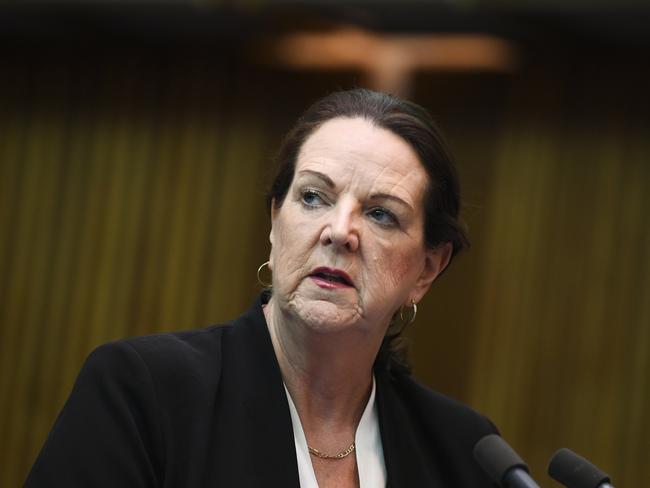
“The National cabinet has asked the Australian Health Protection Principal Committee to provide them with that advice on Tuesday, and it is likely we will see a staged increase in elective surgery now we have the confidence we have that supply – that critical supply of PPE behind us to support that- and certainly we were well aware of the importance of IVF to the community and particularly those who are keen to continue with their program, so we will hope to be able to provide advice on that in the near future.”
Ms McMillan said as of Sunday morning 6606 people were infected with the coronavirus – 51 needing intensive care and 33 on ventilation across the country.
Commenting on the northwest Tasmanian coronavirus outbreak, Mc McMillan said an Australian medical assistance team has been deployed to help.
“That as a team of doctors, nurses, pharmacists, pathologists, a whole range of people who have gone there to provide the service that can no longer be done because all of the healthcare workers or a majority of them in that area have had to be isolated because of that outbreak,” she said.
There are more than 800 people registered as a part of AUSMAT on a database that we keep updated and they are all trained and a large number of them are ready right now if we need to call on them to support Australia in whatever way it might be needed.”
AUSSIES STRANDED UNLESS FLIGHT BOOKED HOME
The family of an Australian dancer stranded on one of 40 ships off the coast of the US and in the Caribbean due to the coronavirus pandemic has spoken out, saying “they are doing the quarantining and wearing the masks on the ship even though there is no virus on there and no passengers”.
Tina Keast, the mother of dancer Amber Jenkins who is one of 107 Australians involved, said her daughter was floating off the coast of Florida and was still on board the Royal Caribbean’s Adventure of the Seas despite passengers offloading a week ago.
A lack of available flights has meant the Australians are stranded and are not sure when they will be able to fly home.
“Amber is safe,” Ms Keast told AAP on Saturday.
“She is being fed, is well looked after, has a guest room, and they are doing the quarantining and wearing the masks on the ship even though there is no virus on there and no passengers.”
Australia’s ambassador to the US Arthur Sinodinos used social media on Friday to write a letter to the stranded Australians, assuring them the government was “working tirelessly to assist with your safe and timely repatriation to Australia”.
The US Centers for Disease Control and Prevention has prohibited cruise ship crew from travelling on commercial flights in the US.
“This is making it extremely difficult for cruise lines to make viable logistical arrangements for the repatriation of its crew members,” Mr Sinodinos wrote.
The Australian government has worked with cruise ship companies across the globe to help facilitate the return of Australian passengers and crew.
There are no longer Australian passengers on cruise ships, a Department of Foreign Affairs and Trade spokesman said.
Ms Keast said her daughter was booked on a flight three weeks ago but it was cancelled. They hope a charter flight can be organised to get the Australians home.
The Adventure of the Seas is scheduled to dock at Fort Lauderdale, Florida, on Sunday for supplies. However, Ms Jenkins will not be able to disembark unless she has a flight booked.
“The cruise company is really looking after them well and everyone on the ship is happy,” Ms Keast said.
“If they can get a charter flight organised for all of them to fly home, they will all jump on and do it.”
HEALTH MINISTER: AUSTRALIA ‘ACHIEVED SUSTAINED, GENUINE FLATTENING’
Health Minister Greg Hunt says Australia has achieved “a sustained and genuine flattening of the curve”.
The growth rate of new coronavirus cases has now been kept below one per cent for seven days in a row.
Across the country, 184 people remain in hospital, including 51 in intensive care and 33 on ventilators.
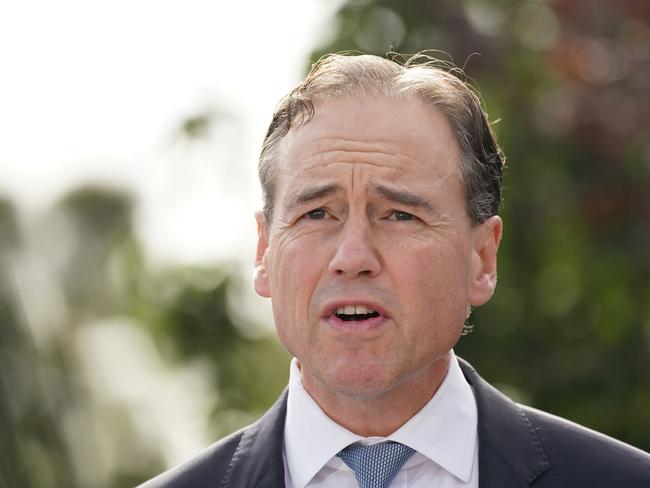
He comments, made on Sunday morning, come amid news Australia is demanding an independent review of the coronavirus pandemic to determine how the disease started and if more could have been done to stop it spreading.
Transparency – particularly from China – will be “key” to any review said Foreign Minister Marise Payne.
“An independent review would identify for us (facts) about the genesis of the virus, about the approaches to dealing with it, and addressing it about the openness with which information was shared,” she said.
“(And) about interaction with the World Health Organisation into action with other international leaders.
“All of those sorts of things will need to be on the table.”
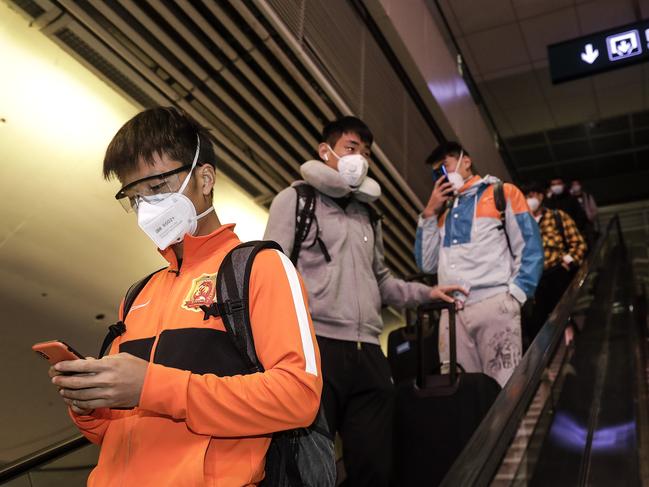
Ms Payne said every country would need to agree to a mechanism for the review, but argued it should not be done by the WHO as its own activities would likely be assessed.
“We’ve been able to do those sorts of things in the past for key independent reviews, often on egregious human rights issues, for example,” she said.
“And I think that there will be a path through.
“But it will need parties and countries to come to the table with a willingness to be transparent and to engage in that process, and also ensure that we
have a review mechanism in which the international community can have faith.”
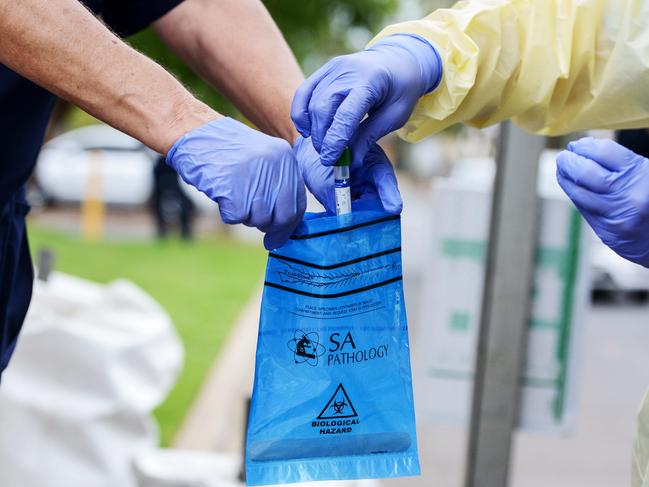
Ms Payne moved to shut down suggestions COVID-19 came from an infectious diseases lab in Wuhan and reiterated Australia’s concerns about wetmarkets in China.
“I think it’s clear that the virus originated in Wuhan, and most likely in the wet market,” she said.
“We have expressed our concerns about the opening up of wildlife wet markets in that context,” she said.
“We would be very, very careful to ensure that all health precautions could be taken.
“As they operate currently, I think it’s dubious as to whether that is possible, so that has to be an ongoing question.”
ELECTIVE SURGERIES MAY RESUME SOON
Elective surgeries and IVF could be greenlit to restart within a week as social distancing eases pressure on hospitals and more protective gear arrives in Australia.
Health Minister Greg Hunt said he was hopeful the country’s medical expert panel and National Cabinet will be in a position to make a decision on recommencing some surgeries at either its Tuesday or Thursday meeting.
“In particular I know that the prime minister and myself have been very focused on IVF (which) is an important and indispensable treatment,” he said.
“So we are hopeful that over the course of this week, there will be some positive news.”
Mr Hunt said restarting elective procedures depended on the pressure on hospitals and availability of personal protective equipment (PPE).
“At this point, Australians have done magnificently and we are not facing a threat to our hospitals, now it is about securing the master and PPE,” he said.
NEW YORK HAS ‘NO CAUSE TO CELEBRATE’
New York Governor Andrew Cuomo announced 540 more coronavirus deaths overnight across his state, which is the epicentre of the pandemic in America — down 110 fatalities from a day earlier, and the lowest tally since April 1.
But as other US states push to reopen sooner rather than later, Governor Cuomo said New York has no cause to celebrate.
“Happy days are not here again,” the governor said at his daily press briefing. “That is still an overwhelming number every day.”
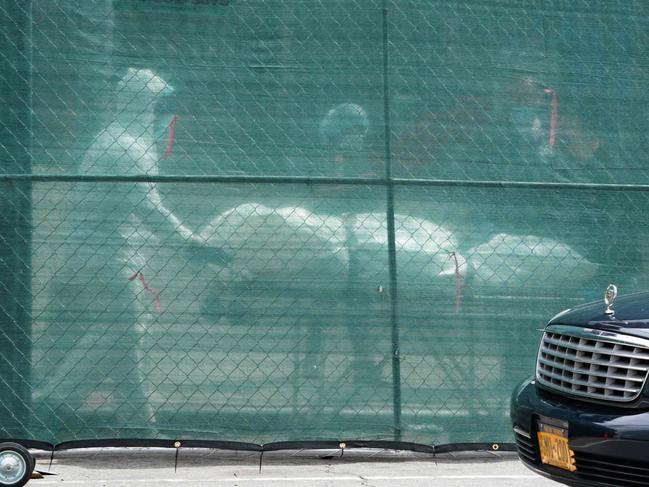
The tally included 36 more people who died in hard-hit nursing homes, which have been hard-hit by COVID-19.
“It is the feeding frenzy for this virus,” he said.
At least 7090 new cases were reported in the last day, for a statewide total of 236,732.
There were 2000 new hospitalisations, bringing that number to around the same level as in March, he said.
And in news from the UK that could send shivers down Aussie spines, The Sun reports that pubs will be the last parts of society to reopen in a phased exit from the coronavirus lockdown.
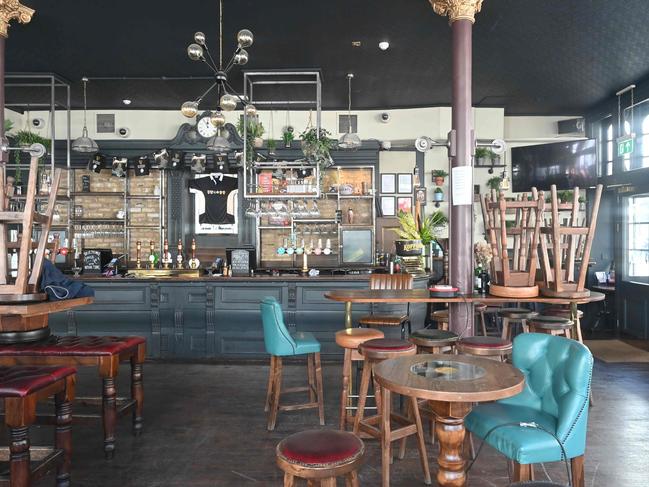
Brits will remain in lockdown for another three weeks to slow the spread of the deadly bug – with the UK government reportedly two weeks away from announcing how the country will emerge from the drastic measures.
Government sources said one plan is to lift the lockdown in phases, with outdoor spaces to be opened first while crowded space like pubs would be last.
It’s a model likely to be coped by Australia.
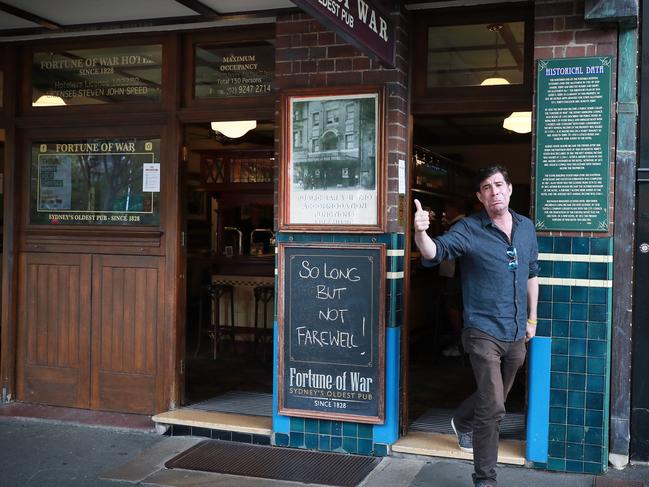
“We’re not at a plateau anymore, but we’re not at a good position,” said Mr Cuomo.
Intubations – people being put on to ventilators with an 80 per cent fatality rate from there – were down by 48 patients, but there are still 4246 patients hooked up to ventilators in New York hospitals, he said.
“Intubations are down which is very good news,” he said.
The infection rate is declining, but reopening the state too quickly could have disastrous consequences, the governor warned.
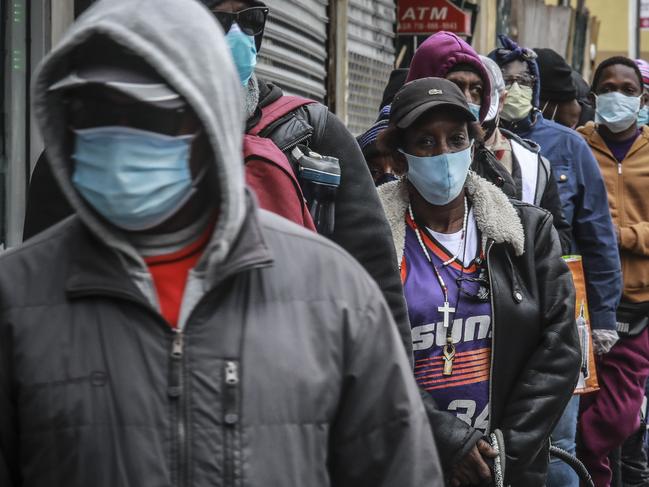
“Everybody wants to reopen,” Mr Cuomo said. “The tension on reopening is: How fast can you reopen and what can you reopen without raising that infection rate?”
Over 23,000 more people were tested for the bug in the past day, bringing that number to 596,532.
The key to reopening is testing on a massive scale, he said.
“The trick with testing is not that we don’t know how to do it … it’s bringing this up to scale,” Mr Cuomo said.
BODIES PILE UP OUTSIDE FUNERAL HOME
But despite the apparent good news, neighbours walking by an infamous Brooklyn funeral home this week were shocked by the sight of bagged bodies piled outside, unrefrigerated and in full view.
“At one point they had 20 bodies outside,” said a local resident who lives a block from the English Brothers Funeral Home.
“Kids walking by can see them. I was so disgusted that I snuck all the way in one day and saw bodies in bags on gurneys without covers. They’re not refrigerated. I don’t know if these people died of coronavirus or not but if they did and the virus is circulating in the air?”
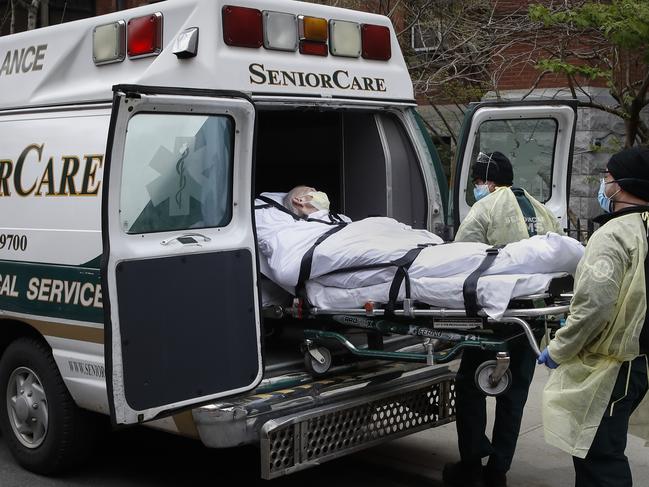
Frank Restivo, 63, who’s owned the mortuary for decades and who was implicated but not charged in a body-harvesting scandal in 2005, didn’t flinch when the New York Post called him on Friday.
“I know,” he said, when asked about the corpses outside. “We’ve got no more room inside.”
Because of COVID-19, Mr Restivo said that he had 40 bodies packed inside the funeral home and was forced to put the other bodies in the side yard.
“The families beg us to take the bodies — which we wish the hospitals could keep a little longer since they have morgues and refrigeration. We’ve never needed refrigeration until now.”
SCOMO ASKS AUSSIES TO CO-OPERATE WITH APP
Prime Minister Scott Morrison has taken to Twitter to assure Australians an app being developed by the government to trace coronavirus cases will not be mandatory.
The app is one of three measures Mr Morrison flagged earlier this week as needing to be addressed to lift the country’s current COVID-19 restrictions.
He said at least 40 per cent of Australians had to use the app to make it effective.
The app would use Bluetooth technology to alert users if anyone they had contact with tested positive to the virus.
The App we are working on to help our health workers trace people who have been in contact with coronavirus will not be mandatory.
— Scott Morrison (@ScottMorrisonMP) April 18, 2020
Mr Morrison tweeted downloading the app “will not be mandatory”, but that the government was seeking the “co-operation and support of Australians to download the app to help our health workers, to protect our community and help get our economy going again”.
In an interview on Friday he appeared not to rule out making the software mandatory if not enough Australians signed up to make it effective, drawing howls of protests from Labor and others.
We will be seeking the cooperation and support of Australians to download the app to help our health workers, to protect our community and help get our economy going again.
— Scott Morrison (@ScottMorrisonMP) April 18, 2020
The other measures Mr Morrison flagged as needed to ease restrictions include an expanded testing regimen and an enhanced local response to potential outbreaks.
Australia’s deputy chief medical officer Paul Kelly says the app’s rollout will begin on a voluntary basis.
“The app would be an extra piece to this puzzle and that timeliness element is the crucial thing,” Prof Kelly told reporters in Canberra.
He also warned the death of a 42-year old male in Australia reinforces that coronavirus is not an old person’s disease.
The man was a crew member of the Artania cruise ship, which was finally leaving Fremantle, Western Australian waters on Saturday on its way to the Philippines. “So that is by far our youngest person that has died in Australia from this disease and a terrible tragedy for that man and his family.”
“But it is a reminder for us that this is not just an old person’s disease.”
A nursing home resident where a coronavirus cluster broke out has also died, taking Australia’s death toll to 69.
The patient was a resident at the Anglicare’s Newmarch House in Caddens in Sydney’s west.
He died ‘peacefully’ on Saturday morning.
NSW Health said 30 people at the aged care facility, including 10 staff and 20 residents, have tested positive to coronavirus.
A 74-year-old man has also died from the virus in Tasmania’s Northwest Regional Hospital, as well as an 83-year-old man from Queensland – who died while quarantining in Sydney – and a 58-year-woman, who died in Tamworth Hospital.
Meanwhile in Victoria, chief of health officer Brett Sutton warned people may not be able to go to sporting matches, concerts or travel overseas until 2021.
He told The Age newspaper it was unrealistic to expect crowds of sporting fans or concertgoers to be allowed to gather in numbers this year.
International travel would be constrained for a long time, he told the paper.
Prime Minister Scott Morrison said earlier this week some of Australia’s restrictions will remain in place for at least the next four weeks.
‘VERY UNHELPFUL’: PM BLASTS HEALTH WORKER
There are fears a coronavirus outbreak among health workers in northwest Tasmania may have spread to three nursing homes.
A 72-year-old man died on Friday at the Mersey Community Hospital at Latrobe in the region.
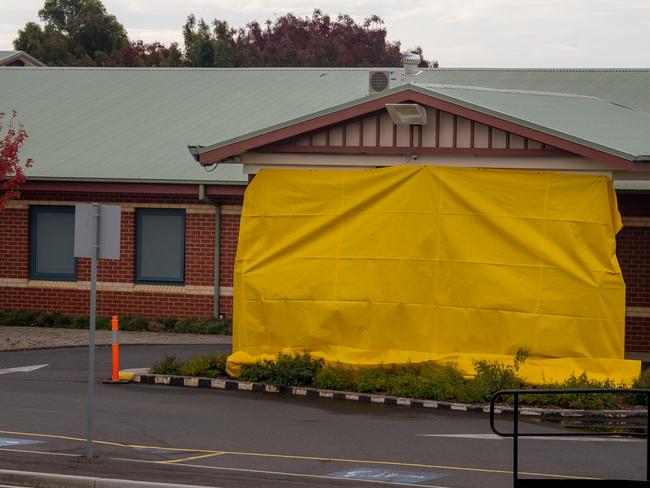
It’s been revealed a healthcare worker who tested positive for the virus did shifts at three aged care homes as well as the two hospitals in Burnie at the centre of the outbreak.
No virus cases have been confirmed at the homes but one resident with mild respiratory symptoms is expected to get test results back soon.
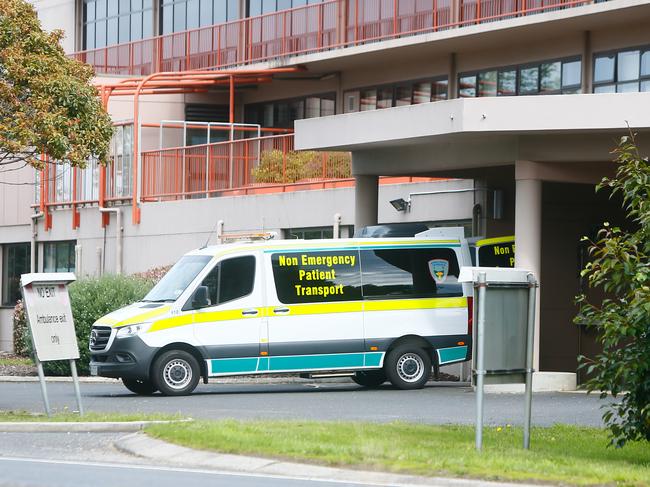
Prime Minister Scott Morrison said that the worker’s actions had been “very unhelpful”.
“We’ve had someone down there not tell the truth to contact tracers about where they’ve been and who they’ve been with,” he said.
“That means a lot of people have been put at risk in northwest Tasmania.”
It came as a crew member from the coronavirus-plagued Artania cruise ship died in a Perth hospital, taking Western Australia’s toll to seven.
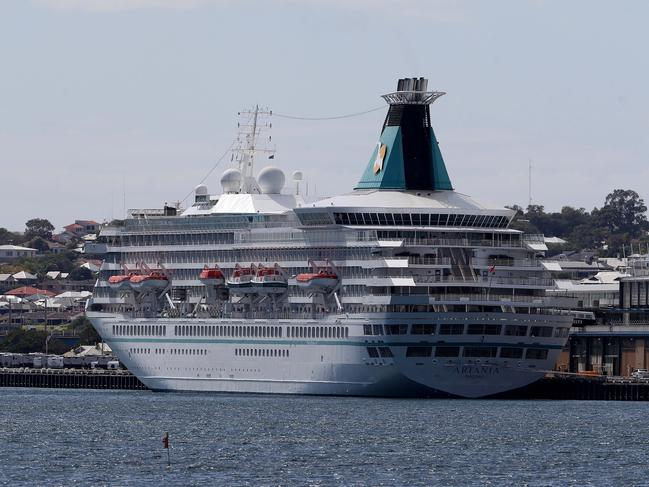
The man was in his early 40s and died at Royal Perth Hospital on Thursday.
“His family have been notified and were put in contact with that crew member via translators … and they were able to reach out to him in his dying days,” WA’s Health Minister Roger Cook said.
ACTIVISTS DEMAND OLYMPIC VILLAGE FOR HOMELESS SHELTER
Activists in Japan are looking to turn Tokyo’s newly constructed Olympic Village into a homeless shelter after the 2020 summer games were postponed until July 2021.
“We don’t know how long this downturn will last, and so we have to change how we think,” Ren Ohnishi, chairman of the Moyai Support Center for Independent Living, said, according to the New York Post.
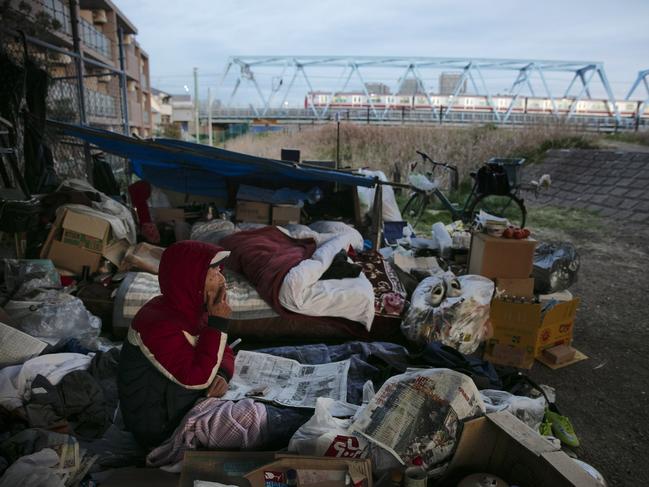
“That includes how we work, how we deal with housing, how we give aid to those who need it.”
The massive construction along the banks of Tokyo Bay was originally designed to fit more than 15,000 Olympic and Paralympic athletes. Grand plans, however, were up-ended by the COVID-19 pandemic and last month the International Olympic Committee officially put the games on hold.
Ohnishi and others have circulated a petition, now signed by tens of thousands, calling on city and Olympic officials to green-light the idea.
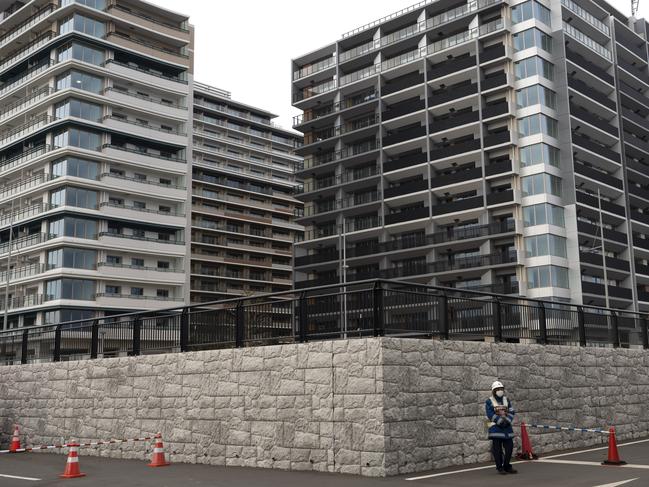
“If the outbreak continues for some time, many people may fall into poverty or lose their homes,” the petition reads.
Reps for Tokyo Olympic organisations and the city government both had no comment on the proposal.
SINGAPORE AND INDONESIA SEE JUMP IN CASES
Singapore reported 942 new coronavirus cases on Saturday, a single-day high for the tiny city-state that pushed its total number of infections to 5992, including 11 deaths.
The number of cases in Singapore has more than doubled over the past week amid an explosion of infections among foreign workers staying in crowded dormitories. This group now makes up around 60 per cent of Singapore’s cases.
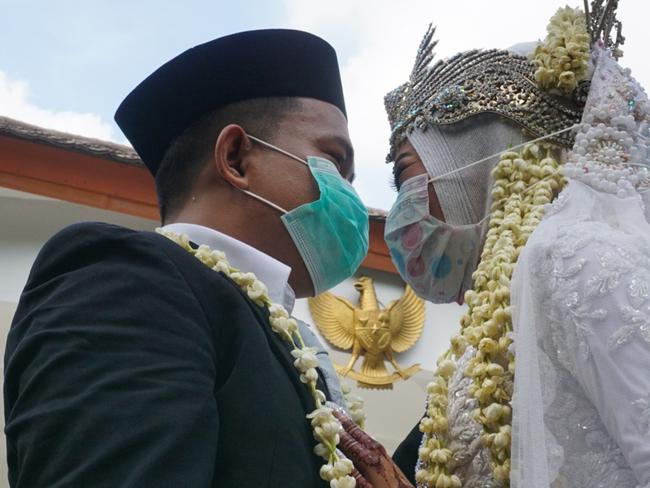
Prime Minister Lee Hsien Loong said Saturday that it will take time to break the chain of transmission in the dorms.
He wrote on Facebook that the vast majority of cases among migrant workers were mild, as the workers are young.
Although cases in the dorms are expected to continue to rise amid ongoing virus testing, Lee said the government is building up its health care and isolation facilities to handle the load.
More than 200,000 migrant workers from Bangladesh, India and other Asian countries live in dormitories in Singapore that house up to 20 people per room with shared facilities.
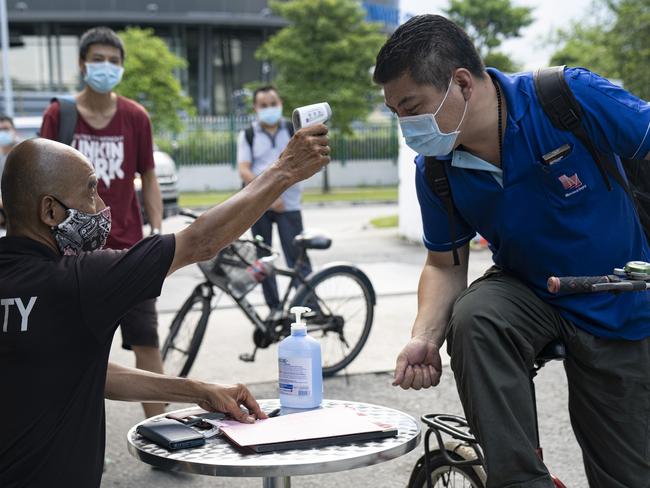
Indonesia has also reported 325 new coronavirus cases taking the total number of infections in the world’s fourth-most populous country to 6248. Health ministry official Achmad Yurianto also reported 15 new deaths, taking the total to 535.
On Friday, Indonesia surpassed Philippines to become the country with the highest number of infections in Southeast Asia.
It has the most number of deaths in Asia outside of China.
JACINDA ARDERN SUED OVER LOCKDOWN
New Zealand Prime Minister Jacinda Ardern is being sued by two men who believe they have been unlawfully detained by the country’s strict COVID-19 lockdown.
The men, who cannot be named for legal reasons, made the claims at the Auckland High Court on Friday during a virtual meeting, according to local media platform Stuff.
The men have asked for a writ of habeas corpus, which seeks to rule an imprisonment unlawful and release the applicants.
They further told the court the United Nations Secretary-General should have been consulted before the lockdown restrictions were imposed and the lockdown decision was made with no real evidence, as reported by Stuff.
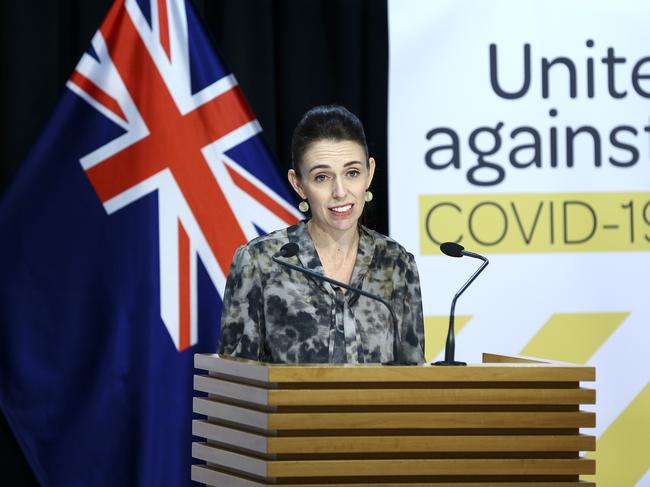
Crown lawyer Austin Powell, who virtually represented Ms Ardern in court, argued the lockdown did not amount to detention.
Justice Mary Peters reserved her decision but said it would be considered urgent.
Ms Ardern will announce on Monday whether New Zealand can begin to move out of lockdown which has been in place since March 25.
On Friday the country reported 1409 cases of COVID-19 and 11 deaths.
TRUMP WANTS RESTRICTIONS TO BE EASED
US President Donald Trump is pushing for COVID-19 restrictions to be eased as Australians are warned some concerts and sporting matches may be off the cards until next year.
Mr Trump took to Twitter to urge supporters to “LIBERATE” the democratically held states of Minnesota, Michigan and Virginia where protests against restrictions have occurred.
The US has reported more than 700,000 COVID-19 cases and more than 37,000 deaths.
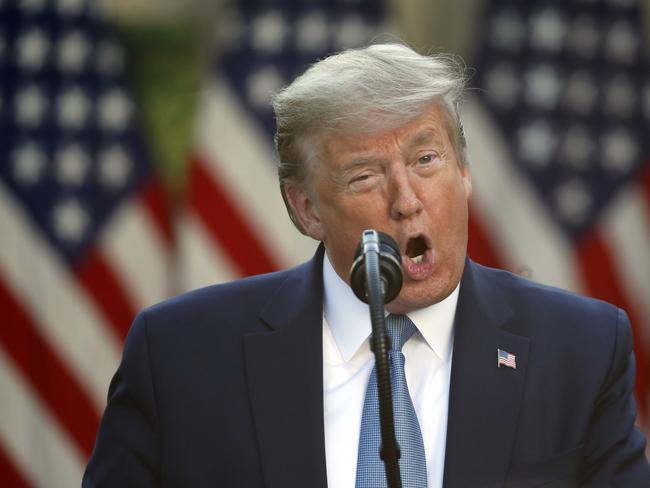
Mr Trump has repeatedly expressed his desire to see businesses reopen quickly and claimed earlier this week that he possesses total authority over the matter, even though the lockdowns and other social-distancing measures have been imposed by state and local leaders, not Washington.
FLORIDA BEACHES PACKED AS VIRUS CASES SOAR
Florida’s locals did not waste any time getting back to the sun and surf when beaches and parks were reopened in Jacksonville – the same day the state clocked a record number of coronavirus cases.
Crowds were seen cheering and rushing the beach as police removed the barriers around 5pm. Friday local time, CNN reported.
Aerial photos show hundreds of people packing the sand to swim, stroll, surf and fish. Many were without masks.
“We all live on it, so it has been torture looking at it and not being able to be out here,” one beachgoer told CNN.
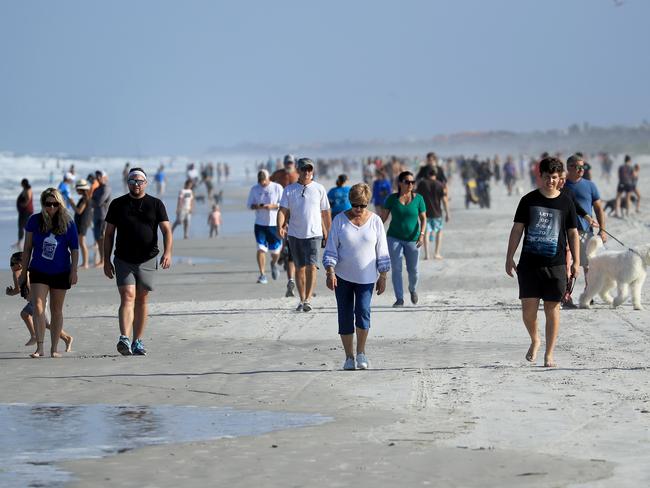
Jacksonville opened beaches from 6-11am and 5-8 p.m. daily, with some restrictions including no sunbathing or lounging in chairs or on blankets.
“This can be the beginning of the pathway back to normal life,” Mayor Lenny Curry reportedly said.
Curry made the call after Gov. Ron DeSantis gave the green light for some municipalities to begin reopening beaches.
Police were seen warning people who didn’t adhere to the no-sunbathing rule, according to photos posted to social media, while a flyover sign warned people: “Do your part. Stay 6 feet apart. Help keep beaches open.”
PROTESTS AGAINST LOCKDOWNS CONTINUE IN US
For the second day in a row, protesters gathered on Friday local time outside the governor’s mansion in St Paul, Minnesota, urging Governor Tim Walz to end the state’s stay-at-home order.
Dozens of protesters lined the street, holding signs and American flags. The group, calling itself “Liberate Minnesota,” said the state’s stay-at-home order has gone on long enough and Minnesotans should be able to go back to work.
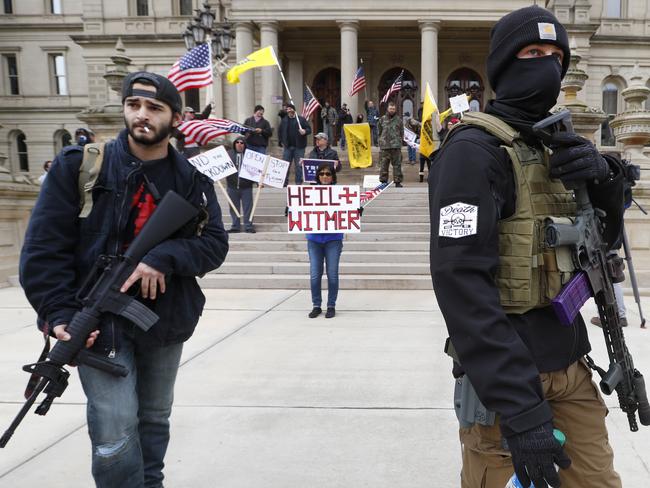
On Thursday, when another group protested at the governor’s residence with the same message, Mr Walz said that while the protesters have a right to demonstrate, he asked them to still abide by social distancing guidelines.
Protests have also broken out in Michigan, Ohio and North Carolina.
US President Trump has announced a staged reopening of the US economy, with each state asked to tick off a number of achievements before reviving different sectors of their economies.
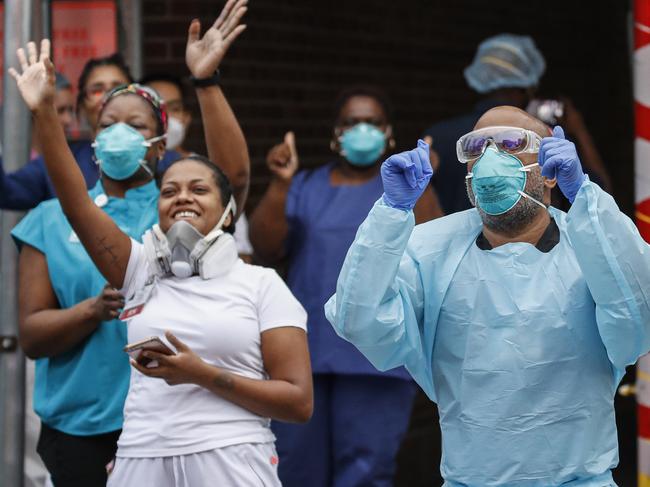
But a day after laying out a road map for gradually reviving economic activity, Mr Trump urged his supporters to “LIBERATE” three states led by Democratic governors.
“LIBERATE MINNESOTA!” “LIBERATE MICHIGAN!” “LIBERATE VIRGINIA,” Mr Trump tweeted as he also lashed out at New York Governor Andrew Cuomo for criticising the federal response.
NEW YORK TESTING SITES TO LAUNCH MONDAY
New York City Mayor Bill de Blasio has stressed that widespread coronavirus testing is key to any prospect of eventually relaxing restrictions that have largely shut down city life, and he announced a step in that direction. Five new walk-in testing sites will be open by Monday, local time, with a focus on residents ages 65 and older in areas with high numbers of cases of the COVID-19 virus.
The sites will initially offer a total of 2400 tests a week, but the city aims to double that quickly.
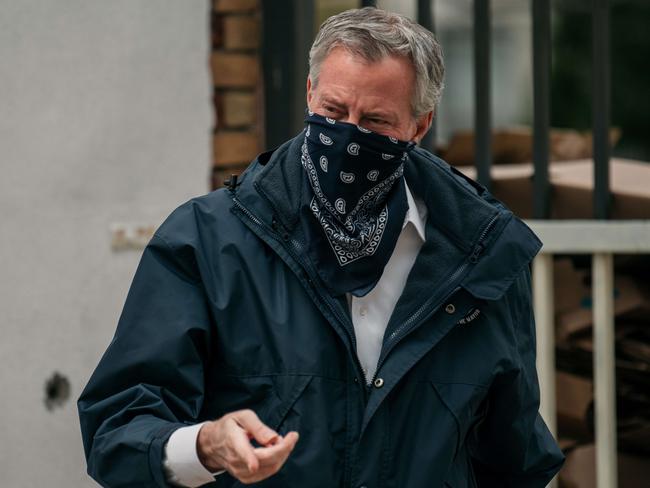
“Everyone’s important,” the Democratic mayor said, but “this is about sharp, clear disparities.” “It is not a statement about anything but focusing on people whose lives are in the greatest danger.”
Separately, five other new testing sites will be available to health care workers who are members of a major union that represents nurses, aides and many others.
Those sites, offering a total of 3500 tests per week, also will be open to other essential workers, including those who work at adult care facilities, and to city residents 65 and older with underlying medical conditions.
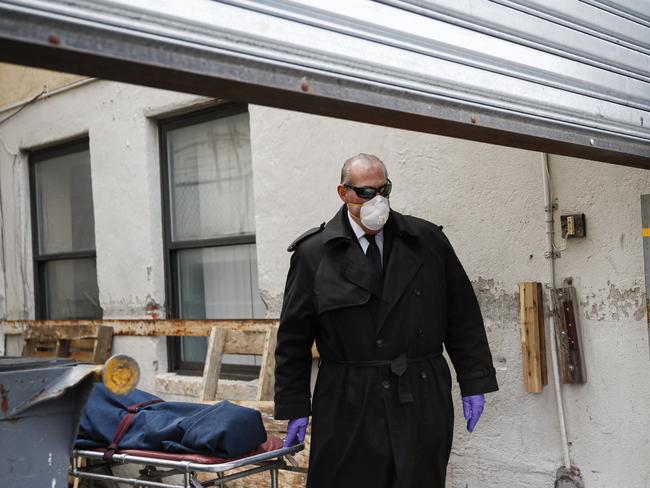
Nursing homes in New York State have been hardest hit by coronavirus. One New Jersey nursing home reported that at least 57 residents had died, while another venue in Queens has lost at least 29 residents to the virus, with some staff saying it might have killed as many as 60 people in the nursing home.
People in New York can now get married remotely over video due to the coronavirus pandemic.
“We are today signing an executive order allowing people to get their marriage licenses remotely and also allowing clerks to perform ceremonies over video,” Melissa DeRosa, the secretary to New York Gov. Andrew Cuomo, said at in a news conference today.
“There’s now no excuse when the question comes up for marriage. No excuse. You can do it by Zoom –– it’s yes or no,” Gov. Cuomo joked.
BRITS WILL HAVE TO WAIT FOR PUBS TO REOPEN LAST
Pubs will reopen last in a phased exit from the coronavirus lockdown, it was reported in The Sun.
British citizens will remain in lockdown for another three weeks to slow the spread of the deadly bug – with the UK government reportedly two weeks away from announcing how the country will emerge from the drastic measures.
But a government source claimed that one plan is to lift the lockdown in phases.
Under the possible plans, outdoor spaces would be opened first while pubs would be last.
The “best case scenario” could see restrictions eased for non-essential shops from early to mid-May.
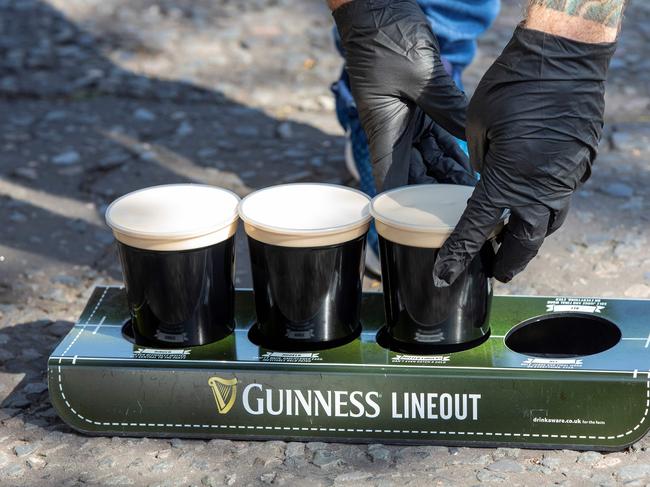
The guidelines could again be relaxed by June and July – allowing for pubs and restaurants to reopen by the end of summer.
There has been growing pressure on the government to outline its plan, with economic paralysis wreaking havoc on jobs and businesses.
Last week, Brits were warned that coronavirus restrictions could remain in place in some form until a vaccine is developed – which could take around 18 months.
TOURISTS MAY NEED COVID-19 CERTIFICATES
Tourists could soon need certificates proving they don’t have coronavirus to be able to travel.
The COVID-free health documents would require holiday-makers to prove that they are not infected with the deadly virus.
Neither the UK nor Australia currently issues the documents, which would require the person to be tested for antibodies.
According to Euro News Weekly, The Madrid Association of Hoteliers (AEHM) are looking into a ‘COVID-19 Free Hotel’ certification, which would guarantee both guests and staff don’t have the virus.
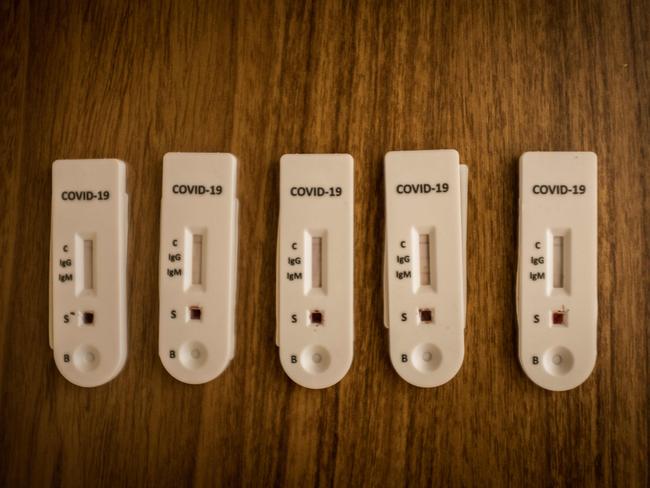
The development comes as the global death toll passed 150,000 early today.
How this would work has not been explained, but guests of the hotel will likely have to be able to prove they do not have coronavirus to stay.
Many other countries banned travellers from entering the country if they didn’t have COVID-free documents shortly before closing their borders.
Thailand ordered any nonresidents last month to have proof from health authorities that they didn’t have the virus to be allowed to travel through, with India issuing similar strict regulations.
The same measures could be reintroduced when lockdowns are slowly lifted.
While the doctors in the UK don’t offer COVID-free documents, another alternative being looked into are Immunity Passports, which would prove the holder has had coronavirus and no longer does.
Health Secretary Matt Hancock previously explained on Question Time: “When the science is good enough to understand the immunity that people have after having had the disease, then we are looking at introducing something like an immunity certificate or maybe a wristband that says ‘I’ve had it and I’m immune and I can’t pass it on and I’m highly unlikely to catch it’.
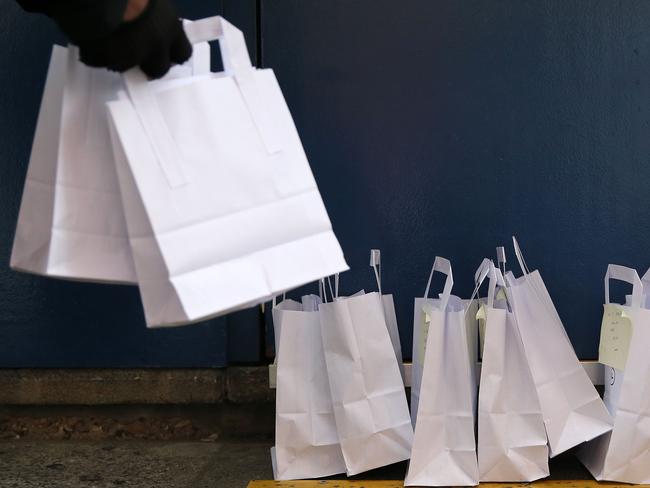
But fears about been raised about the validity of these – with little known about the virus, they may not be able to determine if the person could be infected again.
Claire Standley, assistant professor at Georgetown University’s Center for Global Health Science and Security, told France24 that not only could tests flag antibodies which are not related to coronavirus, but they aren’t “sufficiently accurate”.
She explained: “High false negative rates (lack of sensitivity) of the test mean that those currently available are not recommended for patient-level clinical diagnosis.”
Other measures for travellers are currently being trialled – for example, Emirates recently introduced a compulsory blood test for passengers boarding a flight, with plans to roll it out on other flights.

The test determines if the passenger has coronavirus in just 10 minutes, although the airline didn’t confirm if travellers would be banned from the flight if refusing the test.
Germany is also looking into immunity passports, which could also help end lockdowns.
German Chancellor Angela Merkel is planning on issuing immunity certificates as researchers have begun testing 100,000 people a day for the disease.
The researchers will use antibodies tests which can tell if someone has already had COVID-19 and issue documentation to people to confirm their status.
CHINA DENIES COVER UP DESPITE REVISING FIGURES
China denied it had deliberately covered up the extent of the virus in that country – despite revising up the numbers in Wuhan.
Foreign Ministry spokesman Zhao Lijian – who infamously suggested the US Army introduced the coronavirus to Wuhan – acknowledged that the virus’s rapid spread had contributed to undercounting that resulted in China raising its death toll.
But he said “there has never been any concealment, and we’ll never allow any concealment.”
The allegations China is too close to the World Health Organisation (WHO), were an attempt at “smearing” Beijing, Zhao said.
US President Donald Trump has questioned China’s handling of the pandemic and whether it had been completely transparent since the virus emerged in the central city of Wuhan late last year.
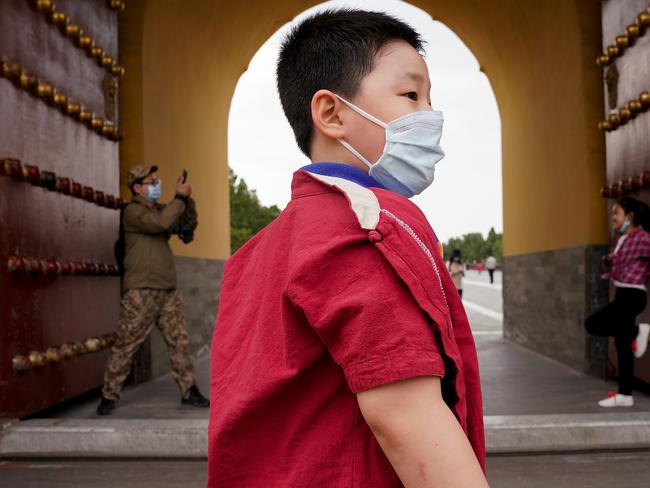
On Thursday local time, British Foreign Secretary Dominic Raab and French President Emmanuel Macron also expressed doubts about China’s virus response.
China’s coronavirus ground-zero city of Wuhan on Friday admitted missteps in tallying its death toll as it abruptly raised the count by 50 per cent — and as world doubts mounted about how transparent China has been during the crisis.
Wuhan’s epidemic control headquarters said in a social media posting on Friday local time that it had added 1,290 deaths to the tally in the city, which has suffered the vast majority of China’s fatalities from COVID-19, the disease caused by the virus.
That brings the total number of deaths in the city to 3869. But the city government only added 325 cases, raising the city’s total number of infections to 50,333.
The change also pushes the nationwide death toll up by nearly 39 per cent to 4632, based on official national data released earlier on Friday.
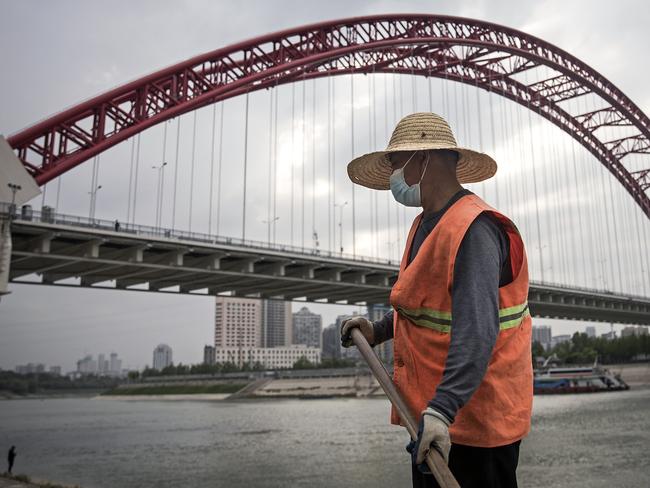
Meanwhile, the woman hailed as the first person to report the coronavirus last December, Dr Zhang Jixian, a respiratory and critical care doctor at the Hubei Provincial Hospital in Wuhan, has talked about the first virus patients.
She said the first two coronavirus patients had been an elderly husband and wife.
“On December 26, the first patient we saw was an elderly lady who had fever, cough and trouble breathing,” she said.
“Her husband and son came along with her. Her husband came to see a doctor for fatigue. He didn’t have a fever … We wondered whether the son was sick as well. Once we did the test, sure enough, the son had the lung problem too.”
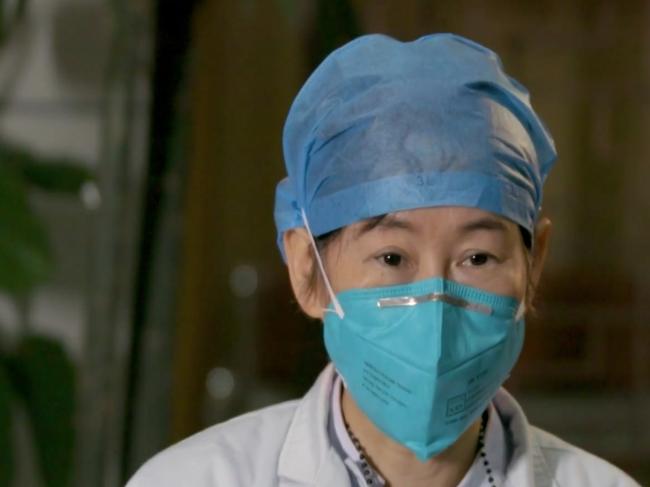
Dr Zhang said the family’s symptoms “looked like flu or common pneumonia” but their CT scans showed significant damage to their lungs.
“We’ve had patients with ground-glass opacities in their lungs caused by virus infection. But his (the son’s) were a lot more and larger than what we had seen before,” she said.
When another patient presented with the same symptoms on December 27, Dr Zhang said she filed a report to the hospital that warned she’d likely “discovered a viral disease, probably infectious”.
UK MEDICAL STAFF TO RUN OUT OF PPE ‘WITHIN HOURS’
NHS staff will have to treat coronavirus patients without full-length gowns as hospitals are set to run out within hours, it emerged on Friday night local time.
Public Health England is set to tell frontline staff to wear a flimsy plastic apron when gowns have run out – which could lead to more hero healthcare workers contracting the virus.
The guidance will be a U-turn on existing advice which told NHS staff that full-length waterproof surgical gowns should be worn for all high-risk hospital procedures, The Guardian revealed.
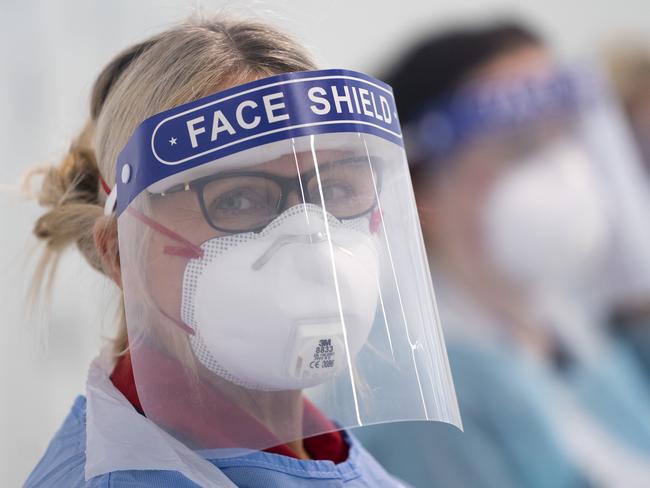
Prof Keith Willett, who has been leading NHS England’s response to the coronavirus crisis, has helped formulate the guidance, which will be sent to all 217 trusts in England later.
Hospitals that still have full length gowns will have to lend them to others, while anyone without will have to make do with aprons instead.
A source with knowledge of the plan told The Guardian: “The new guidance will say ‘this is what you do if you don’t have any gowns’. Wear an apron instead – that will be the new policy for the foreseeable future, though the medical organisations will go mad about that.”
It comes as the head of an NHS Trust in Southern England revealed how he had asked for help from a British fashion company, fearing his staff will soon run out of hospital gowns.
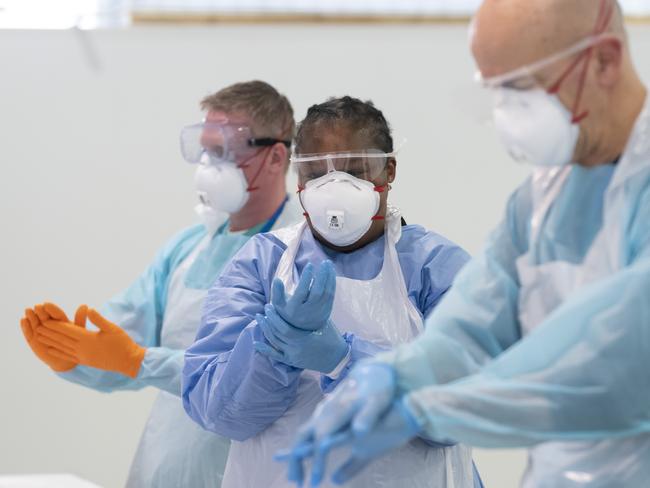
The man, who wished to remain anonymous, asked the BBC for a phone number for Burberry, which has recently retooled its trench coat factory in Castleford, West Yorkshire, to begin PPE production.
Health Secretary Matt Hancock warned the UK was “tight on gowns” but 55,000 more were due to arrive.
He added: “I would love to be able to wave a magic wand and have PPE fall from the sky in large quantities and be able to answer your question about when shortages will be resolved.
“But given that we have a global situation in which there is less PPE in the world than the world needs, obviously it’s going to be a huge pressure point.”
‘IMPROVING’ ITALY UNDER PRESSURE TO GET BACK TO BUSINESS
The leaders of Italy’s northern industrial heartland are pushing Conte to take another gamble and open as many businesses and industries as possible in early May.
The shutdown has devastated once-booming factory towns and left millions furloughed or temporarily unemployed.
Italy’s central bank said industrial production had declined by 15 per cent in March and total economic output was set to contract by five per cent in annual terms between January and March.
But a standoff is emerging between the northern leaders and those south of Rome. Naples’s Campania governor Vincenzo De Luca warned on Friday local time that he may have to “close our borders” to people from the north should those regions’ stay-at-home orders be lifted.
The scale of business reopening will be determined by the number of deaths and recoveries reported over the coming days.
Italy is still digging though data from individual regions to determine the true impact of its worst disaster since World War II.
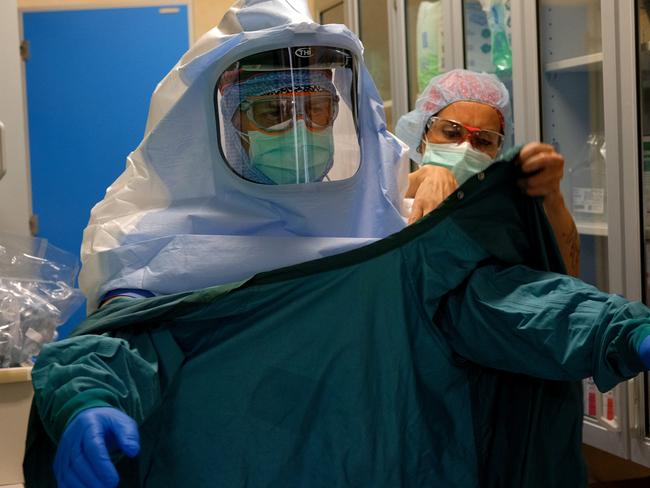
Italian health officials declared victory on Friday over the coronavirus in the poorer southern regions, where hospitals had been stretched to breaking point under the strain of the pandemic.
Prime Minister Giuseppe Conte had warned six weeks ago that Italy’s ability to conquer COVID-19 depended on whether cases can stay largely contained to the richer north.
The disease has now officially claimed 23,227 lives in the Mediterranean country of 60 million people — a toll second only to the United States.
But Italy has still counted itself relatively lucky because the outbreak erupted in provinces with the best equipped medical staff around the financial capital Milan.
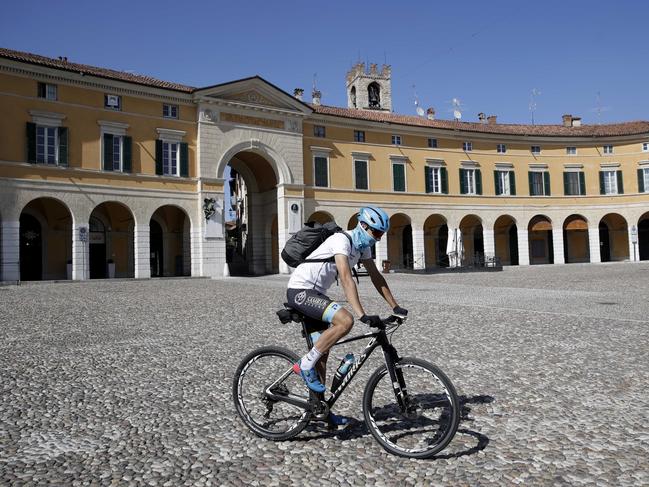
Mr Conte decided to gamble early by imposing the Western world’s first peacetime national lockdown, in the first half of March.
His team argued that the short-term economic pain would pay off by saving the health care system and allowing the country to gradually reopen in the weeks to come.
Italy’s top health officials said that Conte’s big bet had paid off. “We have prevented the spread of contagions in southern regions,” public health council chief Franco Locatelli told reporters “This is now a fact supported by figures.”
The 482 new fatalities recorded in the last 24 hours is the lowest death toll in nearly a week, with the number of new cases remaining stable at 3491, Italy’s Civil Protection Agency said.
QUERIES OVER RUSSIA’S REPORTED DEATH TOLL
Russia confirmed 4070 new coronavirus infections on Friday, bringing the country’s official number of cases to 32,008 and marking the latest one-day record in new cases.
But some suspect the number of deaths in Russia to be much higher, with experts saying that Russia’s testing capacity is hampered by bureaucracy.
Moscow is the country’s hotspot, and since March 30, all 12 million Muscovites have been ordered to follow stringent stay-at-home rules.
They are only permitted to leave their homes to go to work, walk their dogs, take out garbage or visit their nearest shop.
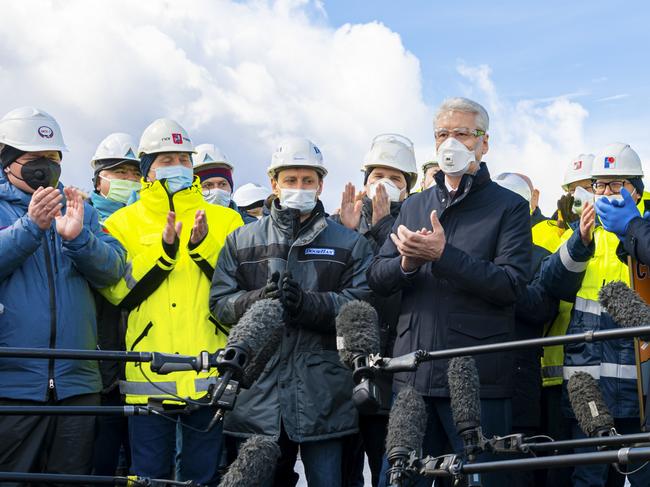
Moscow Deputy mayor Anastasia Rakova warned the city “will face difficult weeks” ahead.
“The peak in morbidity should arrive in the next two to three weeks,” she said in a video released on social media.
President Vladmir Putin, meanwhile, has supported China and its president Xi Jinping, sharing details of a conversation he had with the Chinese president in a readout shared by the Kremlin.
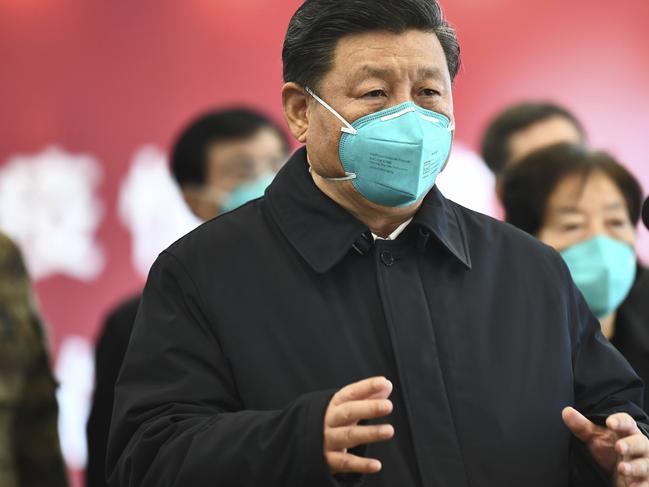
“The Russian side highly appreciated the consistent and effective actions of the Chinese partners, which made it possible to stabilise the epidemiological situation in the country.
The counterproductiveness of attempts to accuse China of untimely informing the world community about the emergence of a dangerous infection was emphasised,” the readout said.
“Both leaders expressed confidence that by continuing to work closely with each other, their countries will be able to successfully overcome the challenges associated with the pandemic,” it said.
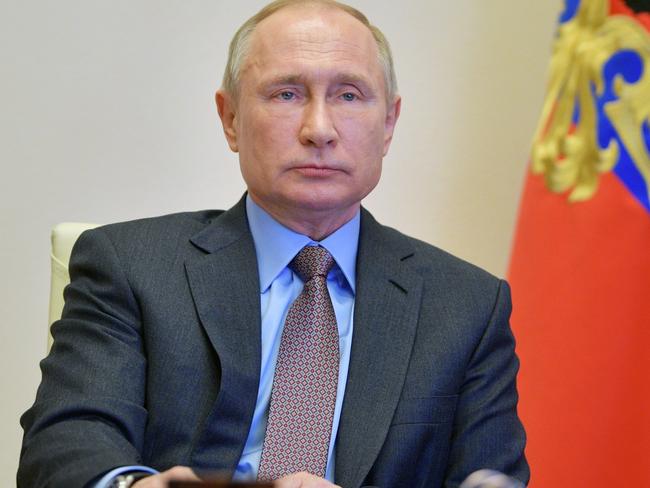
The countries’ strategic partnership has been underlined by their declaration to “further strengthen co-operation in this area, including through the exchange of specialists, the supply of medical equipment, medicines and protective equipment.”
UK’S VIRUS DEATH RATE ‘HIGHEST IN EUROPE’
A leading public health expert says that Britain likely has the highest coronavirus death rate in Europe due to what he described as “system errors,” while the government defended its record in responding to the pandemic.
Anthony Costello, director of the Institute for Global Health at University College London, said the UK “could see 40,000 deaths” by the time the first wave of the country’s outbreak is over.
As of Saturday local time the death toll in the UK had reached 14,576, according to Johns Hopkins data.
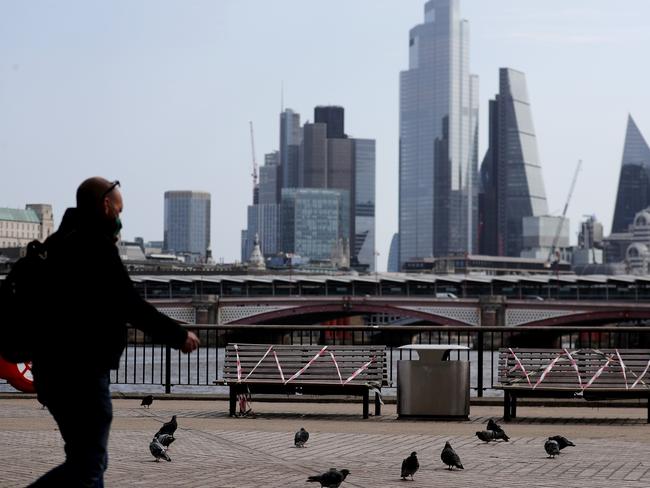
The number does not include hundreds, and maybe thousands, of virus-related deaths in nursing homes and other settings.
Mr Costello has been a vocal critic of the government’s strategy, saying it has not been doing enough testing for the virus and has failed to trace and isolate people who were in contact with infected individuals.
“What were the system errors that led us to have probably the highest death rates in Europe?” he said.
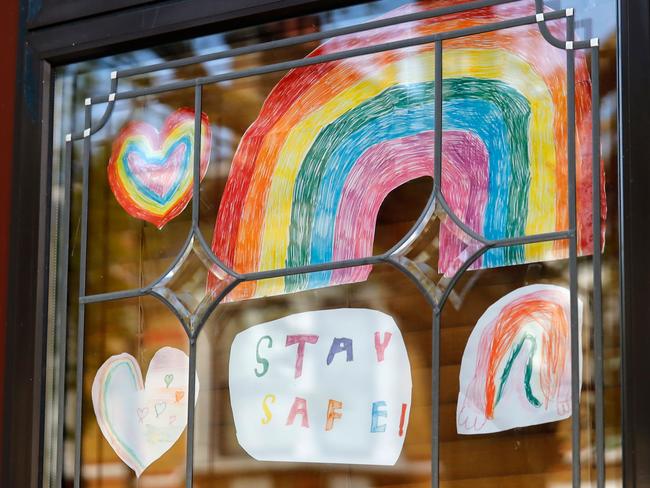
“We’re going to face further waves and so we need to make sure we have a system in place … that enables you to test people rapidly in the community, in care homes and to make sure that the results are got back to them very quickly,” Costello told a committee of British politicians.
Britain was slower than many other European countries to impose mandatory restrictions on business and daily life to slow the spread of the coronavirus. A lockdown ordered on March 23 was extended Thursday for at least three more weeks.
Schools, restaurants and most shops are closed, and most people are allowed to leave home only for essential errands or exercise.
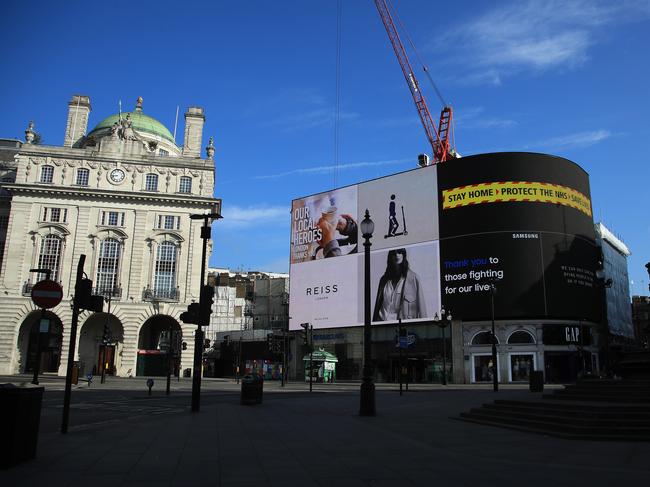
Health Secretary Matt Hancock defended the government’s record, saying “test, track and trace” was part of its strategy.
“I think we took the right measures at the right time,” he said.
The government vowed to conduct 100,000 coronavirus tests a day by the end of April, a more than five-fold increase on current rates.
It has also promised to include nursing home deaths in the official tally.
Meanwhile, Germany’s health minister says the coronavirus outbreak in the country has become “manageable,” with new data showing the rate of new infections has slowed significantly.
Jens Spahn told reporters in Berlin on Friday that the increase in COVID-19 cases isn’t exponential anymore, but linear.
Figures released by the Robert Koch Institute, Germany’s disease control centre, show that the number of people infected by every person with COVID-19 has fallen to 0.7, from over 1 just a few days ago.
German Chancellor Angela Merkel said this week that this so-called reproduction rate was a key indicator the government would take into account when deciding whether to relax the lockdown.
Spahn noted that since April 12, the country has also had more people recovered from COVID-19 than active cases.
Experts say early and widespread testing has helped Germany keep a lid on the outbreak. Spahn said the country has so far conducted 1.7 million tests and is able to carry out 700,000 a week if necessary.
Meanwhile, Spain has reached 20,000 deaths and more than 190,000 total infections.
Spain’s health authorities reported 565 deaths in the last 24 hours.
The total number of deaths in Spain is the third-highest in the world after the US and Italy.
AFRICA COULD SEE 300,000 CORONAVIRUS DEATHS
Africa could see 300,000 deaths from the coronavirus this year even under the best-case scenario, according to a new report released on Friday that cites modelling from Imperial College London.
Under the worst-case scenario with no interventions against the virus, Africa could see 3.3 million deaths and 1.2 billion infections, the report by the UN Economic Commission for Africa said.
Even with “intense social distancing.” under the best-case scenario the continent could see more than 122 million infections, the report said. Any of the scenarios would overwhelm Africa’s largely fragile and underfunded health systems, experts have warned.
The continent as of Friday local time had more than 18,000 confirmed virus cases, but experts have said Africa is weeks behind Europe in the pandemic and the rate of increase has looked alarmingly similar.
The new report is the most detailed public projection yet for coronavirus infections and deaths in Africa, where more than 1.3 billion people are bracing for the pandemic.
Poverty, crowded urban conditions and widespread health problems make Africa “particularly susceptible” to the virus, the UN report said.
TOKYO RECORDS HIGHEST NUMBER OF CASES IN A DAY
Tokyo had 201 new cases of the coronavirus on Friday, setting a new record of daily rise, bringing a prefectural total to 2796, with 56 deaths, according to Gov. Yuriko Koike.
The Japanese capital has seen its new cases shoot up since late March, raising concerns about the infections becoming explosive.
Friday’s rise in the cases comes 10 days after Prime Minister Shinzo Abe declared a month-long state of emergency in Tokyo and six other urban prefectures, a measure he has expanded to all of Japan.
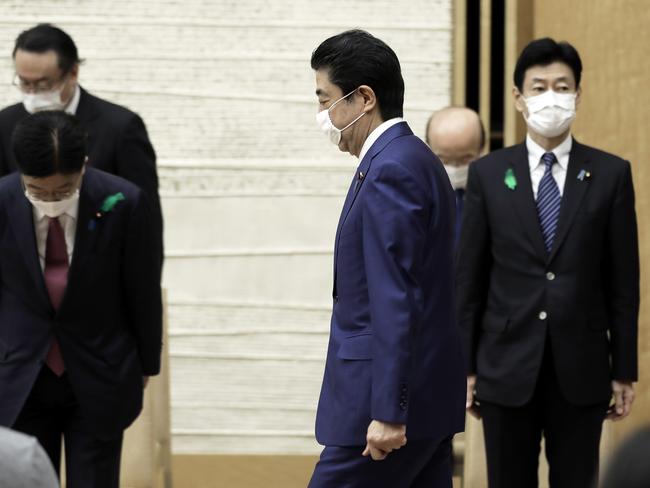
Ms Koike has requested the residents to stay at home and non-essential businesses to shut down. But social distancing was not fully followed, with many people still commuting on trains to work in Japan where remote working is slow to come.
“We are continuing to face a critical situation,” Ms Koike said.
She also said she secured a third hotel for slightly-sick patients to stay and make room at overburdened hospitals as Tokyo faces fear of the collapse of medical systems.
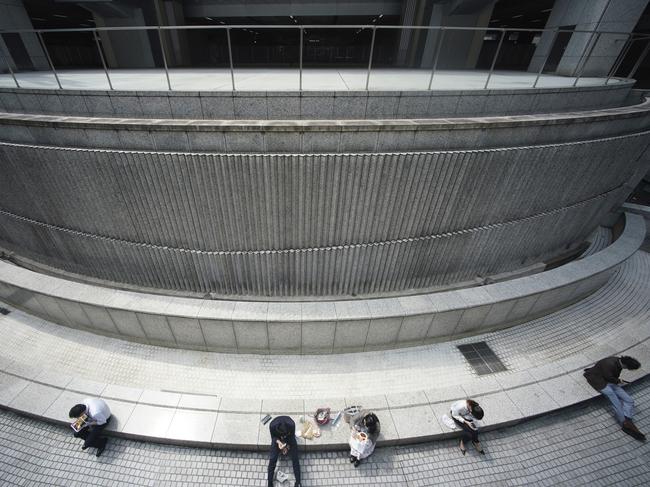
Mr Abe expanded the state of emergency to step up measures ahead of a major holiday week coming up in early May so that people won’t travel around and possibly spread the virus.
The ongoing state of emergency runs through May 6.
Nationwide, Japan has nearly 9900 cases including about 700 from a cruise ship quarantined earlier this year, with about 160 deaths.
Meanwhile, South Korea says it’s continuing to see a rise in patients who test positive for the coronavirus for a second time after being diagnosed as recovered.
However, the risk of transmissions from such cases so far appears to be low.
Originally published as Australia’s curve flattens amid calls for China inquiry


